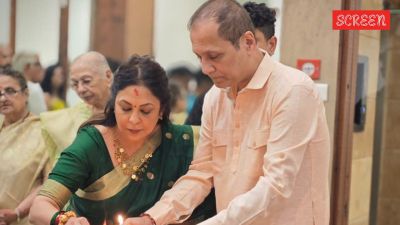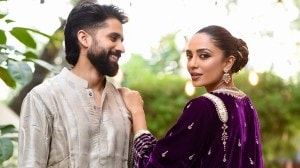Diljit Dosanjh’s untold story: Son of a Punjab Roadways driver who cut his first album at 16; brought Punjab to Coachella and the world
From becoming the first Punjabi artiste to perform at Coachella to sharing the stage with Ed Sheeran, from rocking Jamnagar to acing his social media game, singer-actor Diljit Dosanjh has travelled a long way.
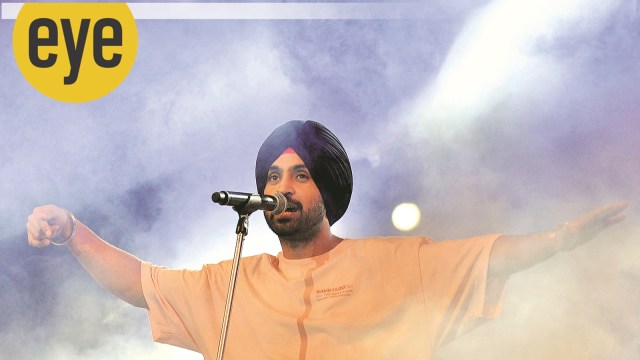 Diljit Dosanjh will be seen next in Amar Singh Chamkila. (Express Photo by Sahil Walia)
Diljit Dosanjh will be seen next in Amar Singh Chamkila. (Express Photo by Sahil Walia)“Beeba munda (A good boy).” It’s a description that has followed Diljit Dosanjh all his life. Forty years, this January. From the old timers in his village and the music producer, who gave him his first break when he was all of 16, to the present crop of globetrotting directors he works with, these two words always crop up when you mention him.
The turbaned singer-actor with the goofy smile, who sent Ed Sheeran’s fans into a tizzy with his surprise appearance on his Mumbai stage last month and had the English singer trot out a line in Punjabi, is taking his music to places it had never gone before. In April 2023, he became the first Punjabi artiste to perform at Coachella, the annual music and arts festival held in California, announcing ‘Punjabi aa gaye Coachella ve (The Punjabis have arrived in Coachella)’. He was also the highest-selling Indian artiste at Brisbane Entertainment Centre last year. He makes no bones about his rustic Punjabi roots, yet he is as celebrated in Bollywood as he is in Pollywood.
Recently, Diljit stole the show at the Ambani pre-wedding celebrations at Jamnagar when he had everyone dancing to his “Jatt paida hoya bas chaun vaste” (born to shine) and other hits and had the groom-to-be, Anant Ambani, beseeching him for more with “Bhaaji, bees minute aur (20 minutes more).”
The boy from Dosanjh Kalan, a village near Jalandhar in Punjab, known for its revolutionaries, has come a long way. Balvir Boparai, a songwriter and composer with the Ludhiana-based Finetone Cassettes, still remembers the bashful boy who approached him in 2000. Rajinder Singh, the producer, asked him to select one boy from among a handful, and he picked Diljit. “He barely had any beard, but he had the rhythm, did bhangra well, and tied a very good turban,” says Rajinder. Also, he was a very god-fearing beeba boy, who was hungry to learn. “He was 16 when we cut his first album Ishq Da Uda Ada (The ABC of Love). By the time he was 17, he was charging Rs 50,000 for a show and was getting booked almost every day during the wedding season,” says Boparai, who partnered with him.
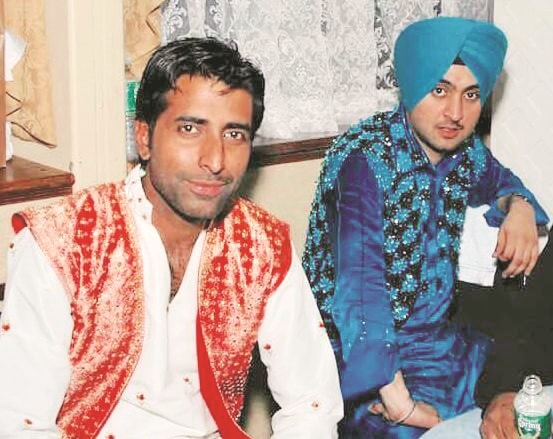 Diljit Dosanjh (right) with songwriter and composer Balvir Boparai.
Diljit Dosanjh (right) with songwriter and composer Balvir Boparai.
Makhan Singh, sarpanch of his village, whose son was his classmate at a primary school at Dhahan Kaleran, not too far from Bhagat Singh’s ancestral village of Khatkar Kalan, remembers him as a good kid (beeba munda). “His father Balbir Singh was a bus driver with Punjab Roadways who enjoyed playing hockey in his spare time,” says Makhan. Diljit was 11 when his parents sent him to the industrial city of Ludhiana to live with his mother’s brother, Davinder Singh Sodhi, a well-known raagi (hymn singer). Soon, he began to accompany him on the tabla, and even hum along. But the streets of Punjab were reverberating with pop, and Diljit was raring to sing.
Sukhpal Sukh, an Indo-Canadian musician, who recorded Diljit’s second album Dil for Finetone in the UK in 2003, recounts how the youngster considered Michael Jackson his idol. He also had a yen for fashion. “He would try out fancy combinations and then ask, “Bhaaji, jaloos te nahin lag reha (Bro, hope I am not looking like a joker).” Sukhpal says Diljit became Dosanjh during his maiden tour of Canada in 2006 where he was honoured by people from his village. “He returned from the function and asked us, ‘Should I add Dosanjh to my name?’”
Ujjal Dosanjh, the first man of colour to become the premier of British Columbia in Canada, says he’s never met the singer but is very fond of him. “We are connected by our village. Once I heard him tell a radio show host that I was his uncle.”
The tour, coming at a time when British-Indian musician Panjabi MC’s “Mundian to bach ke” (2002) was playing on dance floors across the world, was a turning point in his career. Then came his entry into Punjabi films with a guest role in Mel Kara de Rabba (2010) in which he was noticed despite a star cast that included Jimmy Shergill and Gippy Grewal. The very next year, he was cast in a lead role with Grewal in Jihne Mera Dil Luteya, which was a runaway hit. An actor was born.
Today, he is the only Pollywood actor who’s transitioned seamlessly to Bollywood with his turban and Punjabi accent intact. From Udta Punjab in 2016 to Phillauri (2017) and now Crew this year, Diljit has slipped effortlessly into every character he’s played.
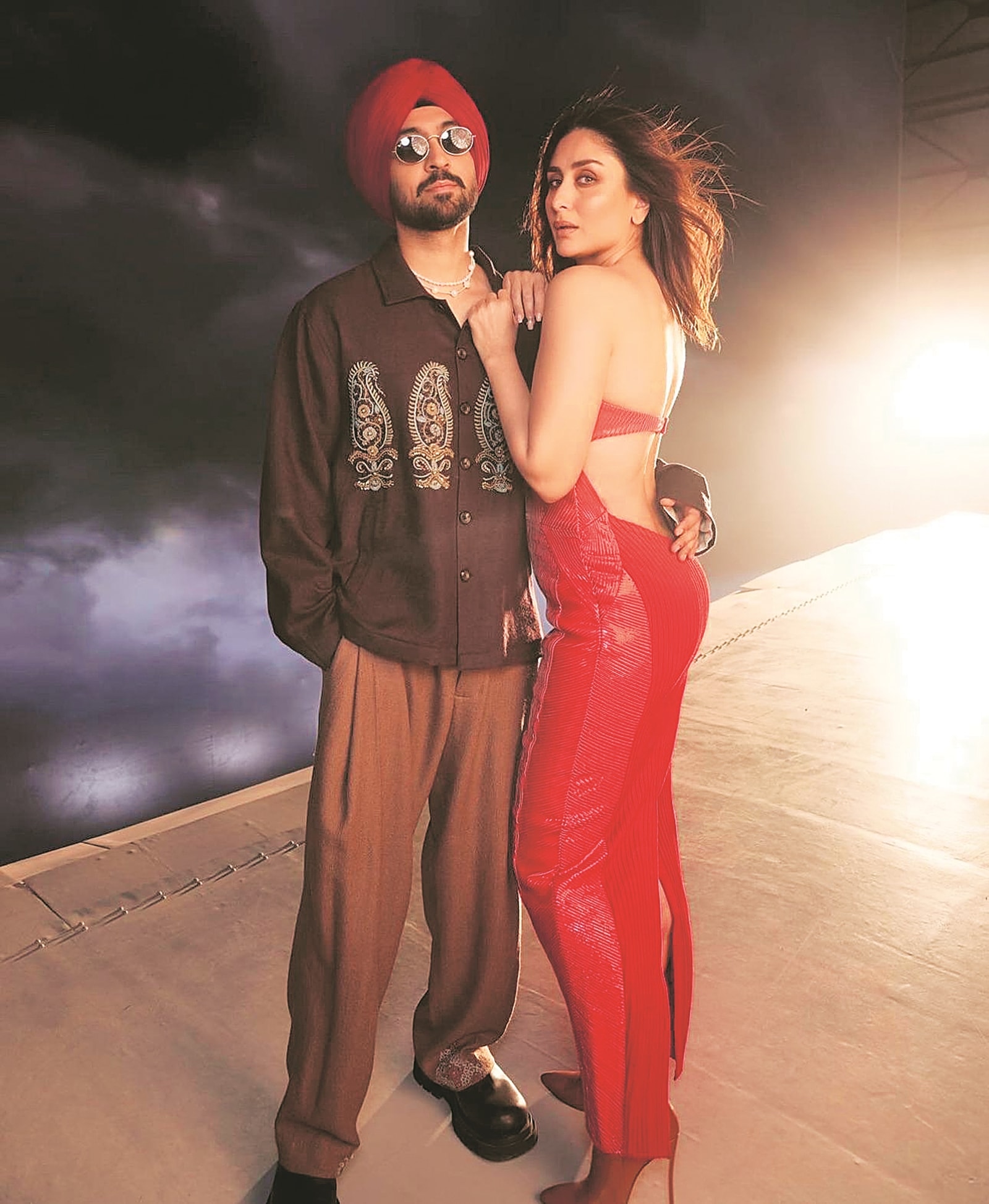 Diljit Dosanjh and Kareena Kapoor Khan in Crew.
Diljit Dosanjh and Kareena Kapoor Khan in Crew.
Anurag Singh, who directed Diljit in both the romcom Jatt and Juliet (2012) and the sombre Punjab 1984 (2014), says he’s yet to come across a more hardworking and disciplined artiste. “He is also very gifted and has excellent comic timing. In fact, a lot of what you see in Jatt and Juliet, including that giggle, is him.”
Jagdeep Sidhu Jaggi, writer and director for Jatt and Juliet 3, which will release this June, says Diljit does a lot of homework for his characters, and works on both his voice and fitness every day. “In the UK, we had to shoot at 6 in the morning, he would wake up at 4 to do his fitness drill. He talks and thinks work, you will never hear him gossip.’’ Others remark about the effort he puts into marketing Brand Diljit through social media.
Through his Insta reels, Diljit takes his fans along wherever he goes, from Mumbai’s Dadar flower market to a monastery in Ladakh. His cooking videos that started during Covid are a hoot — only he can do bhangra in the kitchen while stirring the ladle. The latest shows him rustling up some kind of panjeeri to get energised for his Dil-Illuminati tour of Canada, starting late April.
View this post on Instagram
Although he goes to great lengths to avoid controversy, not giving interviews unless promoting an upcoming film, he doesn’t shy away from taking a stand. He did so during the 2020 farm agitation when he simply said that he supported the farmers. Anurag remembers how he was hunting in vain for producers when he set out to make Punjab 1984. “Diljit said, ‘Don’t worry, I am with you all the way.’’’
An intensely private person, little is known about his family but friends say his wife is an American-Indian and they have a son, and his parents live in Ludhiana.
Prof Paramjit Singh Judge, a sociologist whose book on Punjabi singers is under publication, says while Diljit may not have brought a paradigm shift in Punjabi music like Amar Singh Chamkila or Sidhu Moosewala, both of whom also wrote their own songs, he is a likable package. “After Moosewala’s death, he’s become the biggest superstar of Punjabi music and the fact that he’s a good actor adds to his appeal.” Be it “Do you know main tainu kinna pyar karda” or “Lamborghini te kite launda phire gediyaan,” Diljit sings in the acceptable idiom.
He makes no pretensions of originality or exceptionalism. “I want to make music that my audiences like,’’ he says. He is equally dismissive about his acting prowess. “Every Punjabi can act.”
Mandeep Singh Sidhu, a film critic with arguably the largest collection of Punjabi music and films from 1928 onwards, says what’s most remarkable about Diljit is his enduring humility. “Be it a spot boy, a star or a fan, he treats everyone with equal respect, he doesn’t have an iota of attitude. And he is as god-fearing today as he was when he started out.’’
Anurag attributes this “purity and innocence” to his connect with audiences across the barriers of language and geography. But the humility hides a razor-sharp brain, a deep sense of his roots, and an audacious ambition founded on faith. Jaggi says he’s never seen an artiste whose dreams were so big. “That breadth of vision sets him apart from others.’’ While other Punjabi artistes like Moosewala may have also collaborated with Western singers, it’s Diljit who’s making them rock in Punjabi.
View this post on Instagram
A shrewd businessman, Diljit has been producing his own albums since 2013 and has a film production house as well. In 2022, he signed a partnership with Warner Music to “amplify his global music career”.
So it’s only fitting that he gets to sing the three magical words — Main hoon Punjab (I am Punjab) — in Amar Singh Chamkila. Diljit is Punjab, all that’s wholesome about it. And he remains a Beeba Munda.
- 01
- 02
- 03
- 04
- 05


